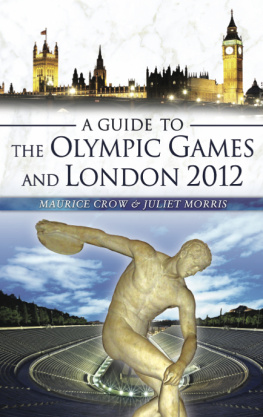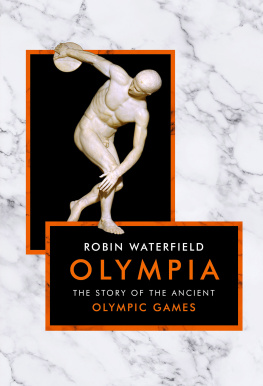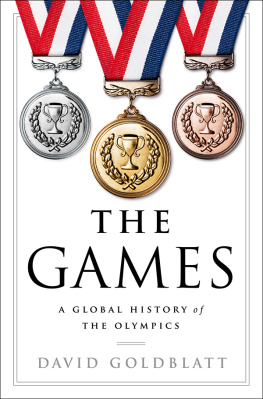THIS IS A BORZOI BOOK PUBLISHED BY ALFRED A. KNOPF
Text copyright 2012 by Benson Bobrick
Jacket photograph of vase copyright 2012 by Art Resource
Jacket photograph of Jesse Owens copyright 2012 by Getty Images
All rights reserved. Published in the United States by Alfred A. Knopf, an imprint of Random House Childrens Books, a division of Random House, Inc., New York.
Knopf, Borzoi Books, and the colophon are registered trademarks of Random House, Inc.
Visit us on the Web! randomhouse.com/kids
Educators and librarians, for a variety of teaching tools,
visit us at randomhouse.com/teachers
For picture credits, please see .
Library of Congress Cataloging-in-Publication Data
Bobrick, Benson.
A passion for victory : the story of the Olympics in ancient and early modern times / Benson Bobrick. 1st ed.
p. cm.
A Borzoi book.
Includes index and bibliographical references.
eISBN: 978-0-307-97447-1
1. OlympicsJuvenile literature. I. Title.
GV721.5.B63 2012
796.48dc23
2011016036
Random House Childrens Books supports the First Amendment
and celebrates the right to read.
v3.1_r1
To Hilary,
volleyball enthusiast


Appendix:
The Olympic Medal Record, Year by Year
ANTIQUITY
c. 2000 BCColonists migrate to an area of Greece later known as Olympia, inland from the Ionian Sea.
c. 1000 BCAn altar to Zeus is established at Olympia.
c. 900800 BCA surge in population leads to the spread of independent city-states and a wave of colonization. Greek colonies are established along the coasts of the Aegean, Tyrrhenian, and Black seas and as far away as southern France. Institutions begin to arise designed to unite these scattered communities and reinforce Panhellenic, or all-Greek, heritage. One such institution is the Olympic Games.
776 BCThe first Olympic festival is held at Elis, Greece, to court the goodwill of the gods. It features a single eventa footrace won by a cook from Elis named Coroebus.
c. 750 BCOlympic-style events are among the highlights of The Iliad and The Odyssey, composed by Homer at about this time.
570 BCThe first golden age of the Olympic Games begins.
476 BCAt Olympia, the sanctuary to Zeus is expanded into a religious complex that draws devotees from all over Greece. For the sports competitions, a big new stadium is also built.
229 BCRome begins its conquest of Greece.
146 BCGreek resistance to Roman rule is mercilessly crushed.
144 BCThe first Olympic Games under Roman auspices are held.
80 BCThe sanctuary at Olympia is sacked during the first of several Roman civil wars.
27 BCCaesar Augustus, the first Roman emperor, proclaims a peace throughout his empire and inaugurates a new, prosperous age for the Mediterranean world. For the next three hundred years, the Olympic Games thrive.
AD 312Constantine the Great proclaims Christianity the official religion of the Roman Empire. The Games decline.
AD 394All pagan festivals are banned by Emperor Theodosius I. The Olympics are officially condemned.
AD 426At the command of Theodosius II, Olympia (including the Temple of Zeus) is destroyed.
AD 522The remaining buildings at Olympia are leveled by an earthquake. In subsequent years, floods from nearby rivers bury in silt the whole area where the stadium had stood.
MODERNPERIOD
1612The Cotswold Olimpick Games are founded in England.
1766An Oxford scholar discovers the site of the ancient Olympic Games in Olympia, Greece.
1829French archaeologists unearth part of the original Temple of Zeus.
1850William Penny Brookes founds the Wenlock Olympian Society at Much Wenlock in Shropshire, England.
June 23, 1894Baron Pierre de Coubertin convenes the first Olympic Congress at the Sorbonne in Paris, France. The International Olympic Committee is formed.
April 6, 1896The first modern international Olympic Games open in Athens, Greece.
1900The second Olympics are held in Paris, France, in conjunction with the Paris Worlds Fair.
1904The third Olympics are held in St. Louis, Missouri, in conjunction with the St. Louis Worlds Fair.
1906The Intercalated Olympic Games are held in Athens, Greece.
1908The fourth Olympics are held in conjunction with the Franco-British Exhibition in London, England.
1912The fifth Olympics are held in Stockholm, Sweden. The Games take hold.
19141918World War I. The sixth Olympics cannot be held due to war but are honored in name.
1920The seventh Olympics are held in Antwerp, Belgium.
1924The first Winter Olympics are held at the foot of Mont Blanc in Chamonix, France, as part of the eighth Olympic Festival. The Summer Olympics are held in Paris, France.
1928The ninth Olympics. The Winter Games are held in St. Moritz, Switzerland. The Summer Games are held in Amsterdam, Netherlands.
1932The tenth Olympics. The Winter Olympics are held in Lake Placid, New York. The Summer Olympics are held in Los Angeles, California.
1936The eleventh Olympics. The Winter Games are held in Garmisch-Partenkirchen in Bavaria, Germany. The Summer Games are held in Berlin, Germany. These were the so-called Nazi Olympics.
19391945World War II. The twelfth and thirteenth Olympics cannot be held due to war but are honored in name.
1948The fourteenth Olympics. The Winter Games are held in St. Moritz. The Summer Games are held in London. The Paralympics are founded by Ludwig Guttmann.
On the night of April 14, 1912, a young American athlete fought for his life in the icy waters of the North Atlantic as over fifteen hundred others around him (including his own father) drowned. His name was Richard Norris Williams, and four days before, he had embarked on the worlds largest ocean liner, the

















